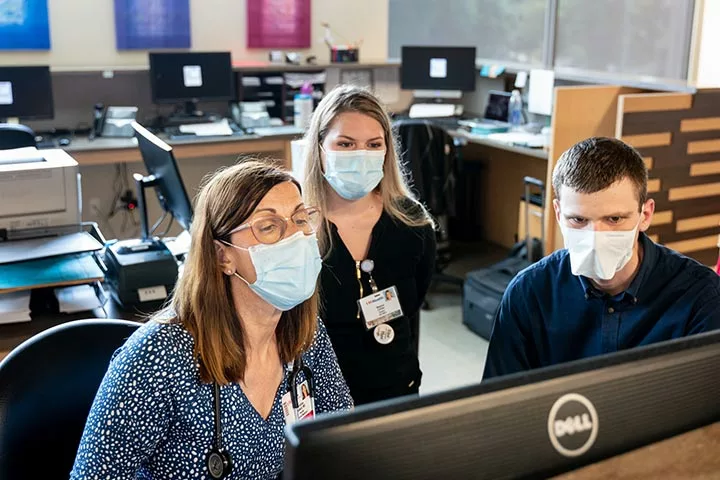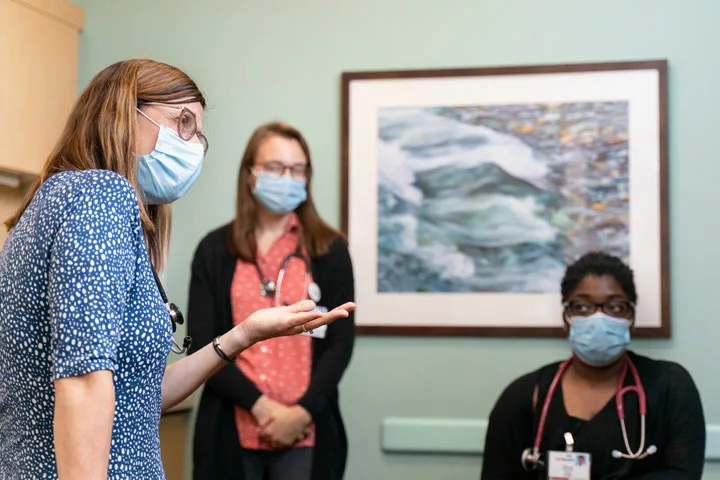Sarah Rothschild Becomes New Wisconsin Medical Alumni Association Executive Director
Since 2014, Rothschild has been the director of constituent relations for the University of Virginia’s Medical Alumni Association and Medical School Foundation.
The University of Wisconsin School of Medicine and Public Health’s student-run system of free community clinics, MEDiC, was poised to enter its 30th year in 2021 reflecting on its past. Instead, the COVID-19 pandemic forced organizers and students to reimagine its future.
Since opening its first clinic at Grace men’s shelter in 1991, MEDiC has continued to grow through the dedication of students, clinician volunteers, administrative support and community partners.
Throughout its history, MEDiC has partnered with various community organizations to expand health care access among medically underserved populations, while also offering a chance for UW–Madison health professions students — who are studying to become doctors, physician assistants, physical therapists, pharmacists and nurses — to put knowledge into practice by working with volunteer clinicians in these fields. The clinics provide a variety of services, including general medical care, physical therapy, dentistry and mental health care. In January 2010, MEDiC officially became a program of the school.
As of early 2020, MEDiC operated five clinics at various partner-affiliated locations throughout Madison. In March 2020, all the clinic locations were closed temporarily due to shortages of personal protective equipment and national restrictions on health professions students seeing patients early in the pandemic. One of MEDiC’s locations needed to shut down permanently because a clinic on the south side of Madison could no longer offer space to MEDiC, according to Meghan Zander, a second-year medical student and MEDiC organizer.
“Due to the pandemic, we had to shut down abruptly and weren’t able to be there for the community during a very hard time, but the student and interprofessional team worked to establish telemedicine services, which we were able to offer to patients starting in June 2020,” explains Zander. “It was unfortunate to have to shut down, but now we have the infrastructure to serve our patients (remotely) if anything like this happens again.”

UW Health stepped in to provide space at its 1102 S. Park St. building. The goal was to help re-establish access to care on the south side of Madison. By March 2021, MEDiC had fully moved into the new space.
“It was a natural fit,” notes Peter Newcomer, MD ’95, chief clinical officer at UW Health and senior associate dean for clinical affairs at the School of Medicine and Public Health, who volunteered with MEDiC during his time as a medical student at the school. “I know from personal experience how important this opportunity is for medical students, and how vital it is to the patients they serve.”
The clinic space wasn’t the only change in this turbulent 30th year of existence, Zander says. In March 2021, MEDiC students began seeing patients in person again, but only by appointment. Previously, patients came to clinic locations on a drop-in basis.
In-person appointments prove invaluable by allowing MEDiC students to assess a wider range of concerns than they are able to address remotely, and they provide an opportunity for the students to build trust and connections with patients after the pandemic-induced pause in services, shares Zander.
“It allows us to provide quality care and connect people with primary care providers to take care of chronic conditions,” she adds.
Another program that has been integrated into MEDIC — but has been paused during the pandemic — is Reach Out and Read, a national program that supports children’s language and literacy development. Through this program, MEDiC students advised parents on the importance of reading aloud to young children, including strategies for enjoying books with infants and toddlers. Children received a free book from a MEDiC volunteer, and the volunteer also read aloud to model the behavior for parents.
According to organizers of Reach Out and Read — when possible, given public health requirements — volunteers want to provide a positive reading experience for children and model reading aloud for parents because some may have never seen good reading-aloud techniques. The goal is to help children learn to enjoy books. Volunteers hope parents will read to children at home.
In July 2021, UW Health granted the students permanent use of the space at 1102 S. Park St. and helped secure referral appointments at Access Community Health Centers, a non-profit organization that offers a full range of medical services for patients of all ages. Access Community Health Centers, with three locations in Madison, has a mission of improving the health and lives of people who otherwise face financial, cultural and/or language obstacles that prevent access to high-quality, affordable health care.
MEDiC student and clinician volunteers are now seeing patients in person at the Southside Clinic, the Salvation Army clinic, MEDiC Mental Health and Michele Tracy Clinic. Other new initiatives are in the works.

“When I think about the challenges of reopening MEDiC’s Southside Clinic (in the new space at 1102 St. Park St.) during the pandemic, I’m totally in awe of the creativity and dedication of our volunteer students and providers,” observes Kristi Jones, community services program director for the School of Medicine and Public Health. “Their tenacity, combined with clinic space generously provided by UW Health, has made reopening not only possible but successful.”
MEDiC shines as an example of the Wisconsin Idea — UW–Madison’s unique commitment to collaborate with the people of Wisconsin, sharing knowledge and resources with the goal of improving lives everywhere. Further, MEDiC reflects the spirit of the integrated UW School of Medicine and Public Health and its collaboration with other UW–Madison health sciences schools and programs.
Christine Seibert, MD, associate dean for medical student education and services, a professor of medicine in the school’s Department of Medicine, and the current faculty advisor for MEDiC, says the student-run free clinic system provides a unique, authentic interprofessional learning opportunity for students early in their education, laying a foundation they will continue to build upon throughout their careers.
“MEDiC’s 30th anniversary is testimony to the long-standing dedication of our student and faculty volunteers, who go ‘above and beyond’ on evenings and weekends to provide care to our most vulnerable neighbors,” says Seibert. “It is clear that these experiences are a critical part of the students’ formation as community-engaged health professionals, and we are so proud of their commitment.”